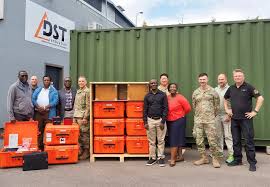
Zambia has received three state-of-the-art mobile laboratories as part of a partnership with AFRICOM and the United States Embassy, aimed at strengthening infectious disease surveillance across southern Africa.
The mobile labs, designed to detect biological threats quickly, are intended to support nine countries in the region: Zambia, the Democratic Republic of Congo, Angola, Namibia, Botswana, Zimbabwe, Mozambique, Malawi, and Tanzania.
The initiative is expected to enhance rapid identification and response to infectious diseases before they spread across borders.
Colonel Michael Cohen, AFRICOM’s commanding surgeon, described the project as “a major milestone in multinational cooperation.” He highlighted that the joint efforts over recent years represented significant progress in improving regional health security.
Dr. Kennedy Lishimpi, Permanent Secretary of Zambia’s Ministry of Health, underscored the strategic importance of the mobile laboratories. “These laboratories mark a turning point in our ability to identify and confirm infectious diseases quickly, an essential step in preventing large-scale outbreaks,” he said.
The deployment of these mobile units reflects growing concern over cross-border transmission of infectious diseases in the region. By equipping health authorities with the tools to conduct on-site testing, Zambia and its partners aim to reduce response times and improve containment measures.
This partnership also highlights the role of international collaboration in addressing public health challenges. The mobile labs are equipped with advanced technology that allows for rapid diagnostic testing, enabling teams to act decisively in emergency situations.
Officials from Zambia, AFRICOM, and the U.S. Embassy emphasized that the project is part of a broader effort to reinforce regional health infrastructure, increase preparedness, and foster cooperation among neighboring countries facing similar health risks.
With the official handover complete, the laboratories are now operational and ready to support both national and regional efforts to prevent the spread of infectious diseases, representing a significant step forward in southern Africa’s health security framework.



